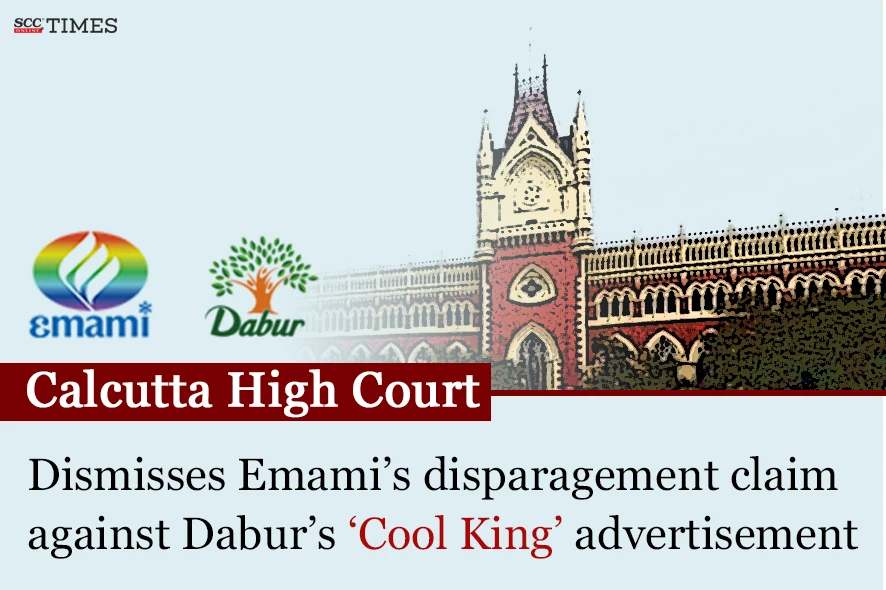Calcutta High Court: In an appeal related to the dispute between Dabur and Emami, wherein Emami alleged that the use of word ‘Sadharan’ in the context of Dabur’s ‘Cool King’s advertisement, demeans and denigrates Emami’s products, , the Division Bench of Sabyasachi Bhattacharyya* and Uday Kumar, JJ, held that calling a product ‘sadharan’ did not amount to disparaging or denigrating it. Thus, the Court held that there was no direct or indirect reference to the product of Emami in the advertisement and accordingly, the dismissed the appeal claiming disparagement against Dabur’s ‘Cool King’ advertisement.
Background
The instant appeal was filed against the order dated 17-1-2025 (impugned order) that modified an earlier order dated 11-7-2024. The order dated 11-7-2024 was passed in a suit granting ad interim injunction which restrained Dabur, its servants, agents, representative and/or anyone claiming through the respondent from displaying, playing, airing or telecasting their advertisements for the product ‘Cool King’ by showing the bottle/container of Emami’s products ‘Dermi Cool’ and ‘Navratna’, by referring to the same as ‘sadharan’.
The impugned order had modified the 11-7-2024 order to the extent that an interim order of restraint was imposed on the advertisement as a whole and not just some part of it. The impugned order had also observed that the use of the word ‘ordinary’ or ‘sadharan’ per se, without any identification, could not be interpreted to be defamatory or disparaging.
In the instant appeal, Dabur marketed their product ‘Cool King’ through an advertisement in which a popular Bollywood actor labelled another bottle as ‘sadharan’ and provided ‘Cool King’ as a better viable alternative.
Emami contended that the bottle in the advertisement labelled as ‘sadharan’ closely resembled the design and make of Emami’s ‘Dermi Cool’ or ‘Navratna’ product. It was alleged that the bottle in the advertisement had a tapering design with a typical notch and slanting cap of green colour which was strikingly similar to the Emami’s products. Additionally, Emami contended that the use of the term ‘sadharan’ in context of the advertisement, demeaned and denigrated their product. Emami also averred that the recall value was high in the public perception, and they would immediately connect the denigrated bottle with the Emami’s products which would considerably undermine the goodwill of their products in the public mind.
Analysis, Law, and Decision
The Court observed that there was a marked difference between the bottle used in the advertisement and the bottle that contained Emami’s products. Emami’s bottle was of a tapering shape with a green slanting cap and a distinct unique notch. However, the bottle shown in the advertisement was a uniform cylinder without any taper and had a round, level cap of black colour. Therefore, the Court held that the difference between the two bottles was clearly visible, even without juxtaposing the two and going by the standard of a person of ordinary prudence and imperfect recollection.
On the question of recall value raised by Emami, the Court noted that from the order dated 11-7-2024 to the date of the impugned order, i.e. for a period of six months, the offending bottle was not shown in the advertisement at all. Therefore, it was highly improbable that a common target consumer of normal prudence would have such a double recall upon viewing the advertisement that they would connect the present bottle with the bottle that was being shown six months ago and would relate that previous bottle with Emami’s product. Thereafter, the Court held that there was no correlation between the bottle being shown in the advertisement currently and the one containing the product of Emami and thus, the ‘recall value’ argument of Emami was turned down.
The Court further noted that the word ‘sadharan’ had been used in a generic sense and did not speak ill about Emami’s products or call it inferior. It merely projected the respondent’s product as extra-ordinary as compared to others’ products which were said to be ‘sadharan’ or ordinary. The Court further noted that the advertisements did not cast any aspersions against Emami’s or any other product while calling it ‘sadharan’. The advertisement did not name Emami’s products or create an impression in minds of the viewer that the products were same.
The Court relied on the case of Dabur India Ltd. v. Emami Ltd, 2019 SCC OnLine Del 9022, wherein the Court held that propagation of the comparative advantage of the advertiser’s product or even calling their goods best was permissible as long as the competitor’s good weren’t disparaged and called bad. The Court opined that it was imperative to strike a balance between the right to advertise your product under Article 19(1)(a) of the Constitution and the right of appellant to protect his product under Article 19(1)(g).
The Court noted that Emami, in the guise of a specific injunction, had sought a dynamic plus injunction, restraining all future advertisements of the respondent. However, such a blanket injunction would be unimplementable since it was up to the courts to decide on a case-to-case basis whether an advertisement actually disparaged another product.
The Court held that there was no direct or indirect reference to the product of Emami in the advertisement and accordingly, the appeal was dismissed.
[Emami Ltd. v. Dabur India Ltd., 2025 SCC OnLine Cal 5487, decided on 2-7-2025]
Judgement authored by- Justice Sabyasachi Bhattacharyya
Advocates who appeared in this case :
For the Appellant: Debnath Ghosh (Senior Advocate), Shuvasish Sengupta, Biswaroop Mukherjee, Mini Agarwal, Ratnadipa Sarkar, Advocates
For the Respondent: Sudipto Sarkar (Senior Advocate), Sourajit Dasgupta, R. Jawaharlal, Megha Kumar, Sudhakar Prasad, Advocates



